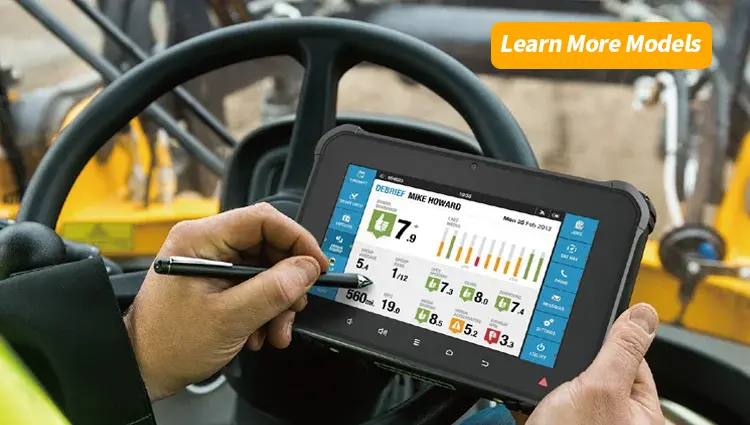The Ultimate Guide to Rugged Mobile Computers
In today’s fast-paced, technology-driven world, rugged mobile computers have become indispensable tools in various industries. These devices, designed to withstand extreme conditions, offer robust performance where conventional devices fail. From warehouses to construction sites, rugged mobile computers ensure seamless operations, minimizing downtime and enhancing productivity. This guide delves into every aspect of rugged mobile computers, providing a comprehensive overview of their specifications, applications, benefits, and future trends.
Technical Specifications
What Defines a Rugged Mobile Computer?
Rugged mobile computers are designed to operate reliably in harsh environments and conditions. They typically feature:
- Durability: Resistance to drops, shocks, and vibrations.
- Ingress Protection (IP): Rated for protection against dust and water.
- Operating Temperature: Functionality in extreme temperatures.
- Screen Toughness: Often equipped with Gorilla Glass or similar.
- Battery Life: Extended battery performance for long shifts.
Key Components
- Processor: Often uses high-performance, energy-efficient processors.
- Memory: Ample RAM and storage capacity.
- Operating System: Usually Android, Windows, or proprietary systems.
- Connectivity: Includes Wi-Fi, Bluetooth, GPS, and cellular options.
- Input Methods: Touchscreen, physical keys, or both.
Applications
Industry Use Cases
Warehouse Management
Rugged mobile computers streamline inventory management, reduce errors, and improve efficiency in warehouses.
Field Service
Technicians use these devices for troubleshooting, accessing manuals, and real-time reporting in the field.
Healthcare
Used in hospitals for patient monitoring, inventory management, and maintaining electronic health records (EHR).
Retail
Enhance customer service and inventory management in retail settings through real-time data access.
Emerging Applications
Military and Defense
Used for communication, data collection, and mission-critical applications.
Agriculture
Aid in precision farming through data collection and analysis.
Emergency Services
Used by firefighters, police, and EMS for communication and information management in emergencies.
Benefits
Enhanced Durability
Rugged mobile computers withstand drops, extreme temperatures, and exposure to dust and water, ensuring they function in the toughest conditions.
Improved Productivity
With reliable connectivity and long battery life, these devices enhance productivity by reducing downtime and ensuring continuous operation.
Cost Efficiency
Despite higher upfront costs, rugged mobile computers often prove more cost-effective over time due to their durability and reduced need for replacements and repairs.
Enhanced Security
Many rugged devices come with advanced security features, including biometric authentication and encryption, crucial for protecting sensitive data.
Challenges and Limitations
Initial Cost
Higher initial investment compared to consumer-grade devices.
Weight and Bulk
Often heavier and bulkier than standard mobile devices, which can be a drawback in certain applications.
Limited Consumer Applications
Primarily designed for industrial use, limiting their appeal for personal or casual use.
Latest Innovations
Integration of AI and IoT
Modern rugged mobile computers are increasingly integrating AI and IoT capabilities, enhancing their functionality and efficiency in various applications.
Advanced Battery Technologies
Development of batteries with longer life and faster charging times.
Enhanced Connectivity
Incorporation of 5G technology to ensure faster and more reliable communication.
Future Prospects
Growth in AI and Machine Learning Integration
Expect continued integration of AI and machine learning for predictive maintenance and advanced data analytics.
Expansion in Emerging Markets
Growing adoption in emerging markets due to increasing industrialization and automation.
Development of Lightweight Materials
Ongoing research into lighter materials to reduce the bulk and weight of rugged devices.
Comparative Analysis
Rugged vs. Consumer-Grade Devices
- Durability: Rugged devices offer superior durability.
- Cost: Consumer devices are cheaper initially but may incur higher long-term costs due to repairs and replacements.
- Functionality: Rugged devices often come with specialized features not available in consumer devices.
User Guides or Tutorials
Setting Up Your Rugged Mobile Computer
- Unboxing: Check all components and accessories.
- Charging: Fully charge the battery before first use.
- Configuration: Follow the setup wizard to configure settings.
- Connectivity: Set up Wi-Fi, Bluetooth, and cellular connections.
- Software Installation: Install necessary applications and updates.
Maintenance Tips
- Regular Cleaning: Use appropriate cleaning agents for the screen and body.
- Software Updates: Keep software up-to-date to ensure security and performance.
- Battery Care: Follow best practices for charging to extend battery life.
Conclusion
Rugged mobile computers represent a significant advancement in technology, offering unparalleled durability and functionality in demanding environments. As industries continue to evolve, the role of these devices will only grow, driven by innovations in AI, IoT, and connectivity. By understanding their capabilities, applications, and benefits, businesses can make informed decisions to enhance their operations and achieve greater efficiency.








